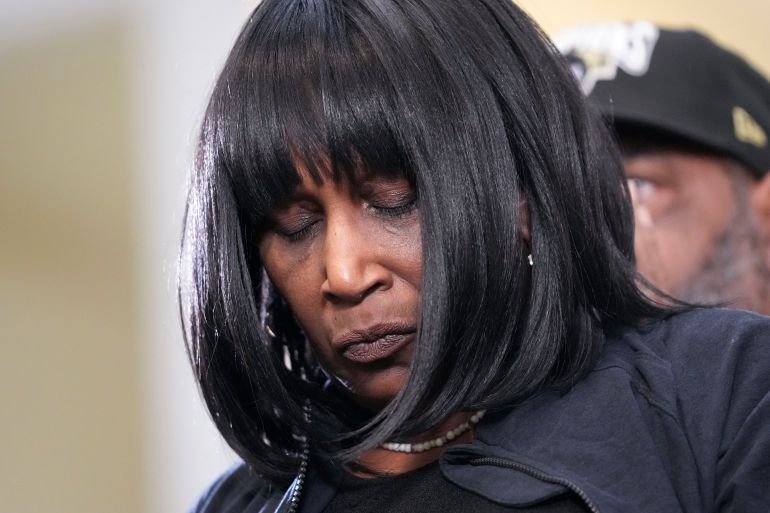Family of Tyre Nichols sues Memphis officials, police officers
The $550-million lawsuit in the US compares the Nichols beating to that of Emmett Till, a Black boy murdered in 1955.

Lawyers for the family of Tyre Nichols, a 29-year-old Black father who was brutally beaten by police and died shortly afterward, have filed a lawsuit against officials and law enforcement in the United States city of Memphis.
The lawsuit alleges that the city’s police officers acted as a “modern-day lynch mob” as they kicked and punched Nichols following a traffic stop on January 7.
Keep reading
list of 3 itemsTimeline of Memphis police beating of Tyre Nichols
Activists link death of Tyre Nichols to ‘cowboy’ police culture
“The savage beating of Tyre Nichols was the direct and foreseeable product of the unconstitutional policies, practices, customs, and deliberate indifference of the City of Memphis and Chief [Cerelyn ‘CJ’] Davis, the City’s chief policymaker for decisions related to the Memphis Police Department,” the complaint reads.
In addition to the city of Memphis and Police Chief Davis, five Black officers who face criminal charges in the beating are also named in Wednesday’s lawsuit.
Also named are another officer who was fired but not charged, and three Memphis Fire Department employees who were fired because they failed to give Nichols medical assistance on the scene.
At a press conference on Wednesday, civil rights lawyer Ben Crump revealed that the lawsuit would seek $550 million in damages — a symbolic number chosen to represent the 55 years since the assassination of civil rights icon Martin Luther King Jr.
It was filed on behalf of Nichols’s mother RowVaughn Wells in a federal court for the Western District of Tennessee.
“This lawsuit and the amount we are suing for is a message that if you keep giving license to these gang-minded police officers to perpetrate acts of terrorism on Black and brown people, then we’re coming to your city and we’re going to bring these lawsuits,” Crump told reporters.
He also called on the public to press for accountability from police and city officials. “If we don’t hold all of them responsible from the top to the bottom, shame on us if it happens to your child. Shame on all of us,” Crump said.
The lawsuit comes as the US continues to debate police violence and racism in the criminal justice system. The beating of Nichols was met with widespread condemnation and unusually swift action to hold the officers accountable.
The five officers involved in the beating were fired and charged with second-degree murder in the aftermath of Nichols’s death. All of the officers have pleaded not guilty and are expected to appear in court on May 1, according to Reuters.
Wednesday’s complaint states that the city hired Davis as police chief with the “full knowledge” that she had played a “prominent role” with a law enforcement unit in Atlanta, Georgia that was eventually disbanded following allegations of excessive force and illegal searches.
The lawsuit alleges that Davis replicated many of those abusive practices when she created a special police group in Memphis known as the Scorpion Unit, which stopped Nichols on the night of his death.
While created under the auspices of combating violent crime in Memphis, the unit gained a reputation among many residents for a “cowboy” culture that sometimes treated low-income neighbourhoods as hostile territory.
“Rather than ‘restore peace’ in Memphis neighborhoods, the SCORPION Unit brought terror,” the complaint says.
The five officers who beat Nichols were members of the unit, which was disbanded by the city amid widespread outrage over the incident.
The lawsuit compares the beating of Nichols with the infamous case of Emmett Till, a Black boy who was brutally beaten and shot by two white men in the southern state of Mississippi in 1955.
Till’s murder — and a decision by his family to hold an open-casket funeral so the country could see his disfigured face — is considered one of the events that helped spark the US civil rights movement.
“Like Till nearly 70 years prior, Tyre was left unrecognizable because of the beating he endured at hands of a modern-day lynch mob,” the complaint reads. “Unlike Till, this lynching was carried out by those adorned in department sweatshirts and vests and their actions were sanctioned — expressly and implicitly — by the City of Memphis.”